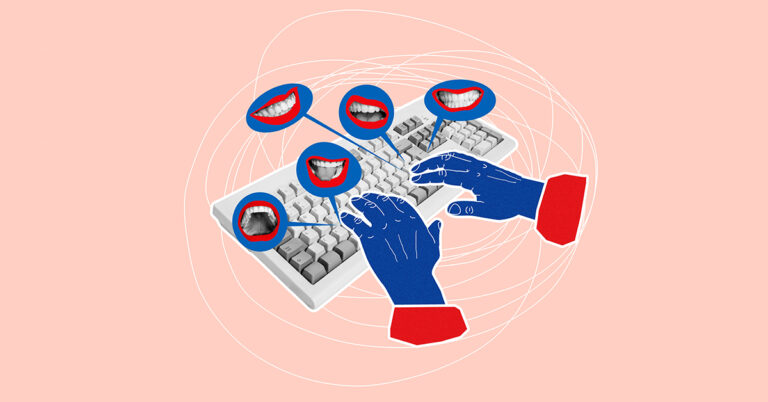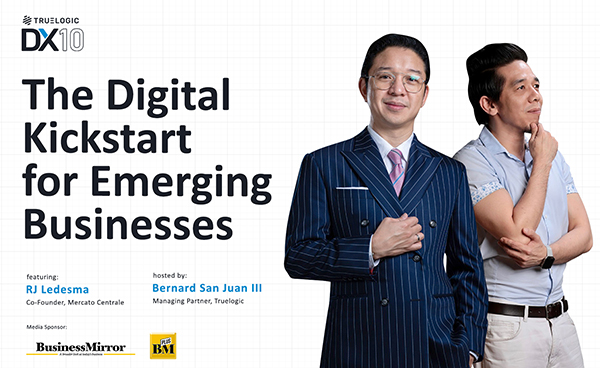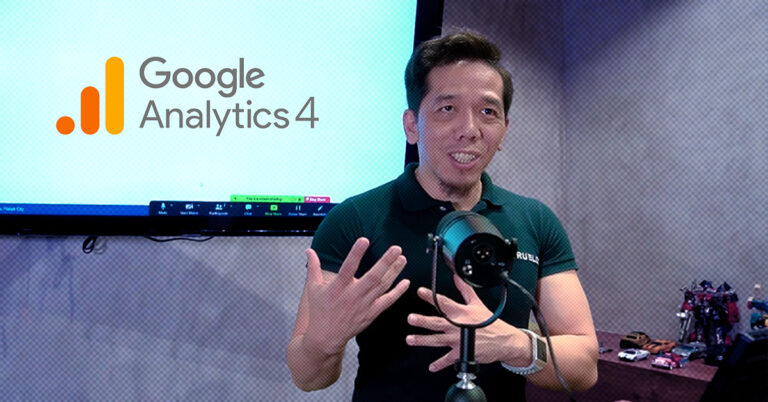Truelogic Episode 45 Recap: Web 3.0: The Future of Internet

Podcast Transcription
Berns San Juan: Web 3.0 is coming. So what’s all the hype about Web 3.0? And you know this is going to be one of those rant rave episodes because I’m going to rant and I’m going to rave some of these things genuinely have me excited. I’m going to buzzword kill them because I hate buzzwords. So talk to most people that write or cover Web 3.0 and you’ll get a lot of buzzwords like decentralized, blockchain, privacy, AI, and intelligence but what do these mean and what do these mean to you? So today, I thought I’d help you out by dipping our toes. We’re not going to deep dive. We’re going to depart those into Web 3.0. And I’ll try to help you understand what’s coming and why you should care.
So how many of you guys have used Siri, Hey Google, Alexa, and all of the other assistants like Cortana? Now, let me modify that question and keep that question in your head for a while. How many of you guys have used Siri? Hey, Google, Alexa, Cortana. And the modification to that question is how many of you guys find Siri, Google, Alexa, and Cortana essential to your everyday activities? How many of these tools or assistants boost your productivity?
I will dare to guess that very few of you will say that these are essential to your daily life. And I will also argue that’s probably because they were probably very well ahead of their time, right? So the next evolution of the Internet has been dubbed Web 3.0. And in this toe-dipping episode, I’m going to try to help you understand the basics of what it is and some practical applications for businesses.
What is Web 3.0?
Web 3.0 is the next evolution of the Internet in which the emphasis is on creating decentralized and a more intelligent web. It aims to give users more control over their data, enabling them to share and monetize it as they see fit. It also aims to create a more intelligent web that can understand context and intent, making it easier for users to find the information they need. Web 3.0 technologies such as the blockchain and AI are being developed to make this vision a reality. So that was ChatGPT’s definition of web three in a nutshell.
And you know I hear you. I hear you right. As soon as I mentioned the term blockchain, I know some of you guys got excited. You know, if you are a ‘bro,’ you probably got excited about it, but some of you guys, and rightly so, would have had your red flags up the moment I mentioned that term. So you know, hold your horses. So the keywords to understand as the hallmark of Web 3.0 is decentralization and intelligence. Now before I dive into those, “Oh, isn’t the web already decentralized? Oh, isn’t privacy already an element on the web? Oh, isn’t AI already on the web?” Might be a good opportunity to break down what Web 2.0 did for us.
Web 2.0: The User’s Web
Web 2.0 happened around the late ’90s and early 2000s. The Internet does not evolve on a specific date and if I were to describe Web 2.0 in the best possible way, I would call it the user’s web. Prior to Web 2.0, so we’re talking web 1.0, there really was no content you produced that could be published online in real-time. Anything that went online had to have the hand of a programmer, had to have the hand of a developer, had to have the hand of an IT person. So you know you couldn’t publish anything without the help of a friendly neighborhood dev on your side.
Web 2.0 changed that. The reason it’s called the user’s web is that the reason you’re able to drag and drop elements from your desktop to your browser is because of Web 2.0. The ability to leave comments on content you really like is because of Web 2.0. The ability to put posts on Facebook, upload videos, and create a YouTube channel, and blog, which was a topic we discussed with Vince a couple of episodes back. All of these are Web 2.0 technologies.
I will even argue, if you’ve got a job that enables you to work from home today, that is only possible because of Web 2.0. Without Web 2.0’s technology, you would have to go back to an office because the office is the place that has the infrastructure for you to do your IT-enabled job, right? So there’s a bunch of stuff like Myspace is a direct result of Web 2.0. Blogspot and Blogger are direct results of Web 2.0. Facebook is a direct result of Web 2.0.
And you know, Web 2.0 is sort of marked by a lot of free stuff. What did you pay to perform a Google search? Google searches are free. When was the last time you paid your subscription to Facebook? Never, right? Facebook subscriptions, your Facebook account is free, and all that jazz. There’s a lot of stuff that was free.
And I think the major disadvantage in that ushered in by Web 2.0, though, is that it did favor large centralized computing power. Amazon, Google, and Facebook are all of these brands that are only possible because of Web 2.0. And the downside is that our data got monetized and got concentrated in the hands of a powerful few right now.
What’s the Difference Between Web 2.0 and Web 3.0?
The biggest difference between Web 2.0 and Web 3.0 is intelligence. I’m not sure if you guys have been paying attention to the technological improvements on the Internet, but search results today are significantly better, more contextualized more relevant than they were ten years ago, 12 years ago, or 15 years ago. And this is the Google algorithm evolving. And I think I’ve already mentioned, and for those of you that have ever written in my lecture, I’ve told you guys about spam brain and rank brain and all the AIs that you will use to improve search results. This is the emerging technology that enables Web 3.0. It becomes more intelligent and more contextualized. If you’re logged in, it becomes more personalized.
ChatGPT: Foundational Technology for Web 3.0
The best example of an emerging technology to support Web 3.0 is ChatGPT. And I mentioned it earlier, if you guys are on Facebook, you may have heard about it. If you guys are on Twitter, you may have heard about it. But ChatGPT is a great example, and it’s not even the best that Web 3.0 will have to offer. If anything, ChatGPT is a foundational technology for Web 3.0. So what I imagine ChatGPT will become is it probably will behave as the large, fundamental basic data set trained AI. And what brands and startups and other businesses will have to do is that they will have to work on the last mile of AI to fit their intelligence requirements to the needs of their customers. Okay, so that was a mouthful. That was a mouthful. What do I mean?
So let’s take the Internet of Things as an example. As an example of the application of Web 3.0. So think of a smart home, so the Internet of Things, and right now they’re not really smart. They’re not really smart, I would say the best definition is they’re either online or they’re programmable, but you know, they’re not really smart. So I would imagine ChatGPT is, is it creates an interface between you and your home devices. And then it would be up to the companies that create these home devices to develop the last mile of intelligence that monitors your personal habits. The time you arrive in the day, the one that keeps track of your fridge temperature, turns on your climate control on and off beside the best strategy that helps you conserve energy in your home, opens your garage at the right time, and so on and so forth. So ChatGPT will not enable those, it will enable the basic technology for your home to understand you, but the technology that understands or that learns from your behavior will have to that last mile bit of AI has to be developed by the company developing the smart home. So that’s one example.
I’ll give you guys a simpler example. Let’s do white-collar work. Imagine a law firm and let’s say if you were a particularly forward-looking law firm, let’s say, you wouldn’t need to build an AI assistant from scratch. What you would do is you would utilize ChatGPT as your foundational AI and then you train your own AI on Philippine laws, Philippine case law, precedents, on historical rulings, whether those are by trial courts or whether those are by the Supreme Court. And what you would get, is ChatGPT being 90% the interface between you and your assistant and 10% AI-like in terms of the history of case law in the Philippines, and what you get is a legal assistant. No humans are required. So ChatGPT will not become your legal assistant, you sort of craft ChatGPT to become a legal assistant by training it with the correct data set. Okay, so this is the intelligence bit of Web 3.0.
Privacy of Web 3.0
So the next phase of Web 3.0 is privacy. So yeah, yeah, yeah, this is enabled by the blockchain, but I’ll dive into two specific technologies just so that you guys can sort of break this apart. There are two pieces of technology that will allow Web 3.0 to protect your privacy, to protect your identity, to prevent, you know, bad players from being able to monetize your data.
So one of them is called an SSI, it’s short for Self Sovereign Identity. And the other one is called the DID or Decentralized Identifiers. What SSIs and the DIDs are replacements for the ad IDs that you guys are leaving all over the place or the mobile ad IDs or the mobile ad identifiers that you guys are also leaving all over the place? Imagine this application as a feature in a browser.
Like one of the things that I would imagine enables this right off the bat is Firefox. Firefox is a more private browser than Chrome. But one of the browsers that I imagine this would come default in would be Firefox. But for browsers that this doesn’t come default in, I would also imagine it being enabled as an extension. And in short, if you have this extension on, it prevents websites from dropping third-party trackers, and third-party cookies onto your browser and tracking your behavior, tracking your location, tracking your IDs, and so on. If a user visits a website that supports SSI and DID, the browser is automatically compatible with GDPR to privacy laws, right? And therefore, you sort of get rid of that primitive pop-up that says “I Agree” and where 90% of the time that’s the only thing you can do anyway. But the browser would automatically generate a digital identity for the user represented by a DID or an SSI that automatically authenticates you and doesn’t ask do you accept or do not accept the cookies that are used on that site. The SSI and the DID will take care of that for you. So it’ll automatically make you compliant with GDPR and other privacy laws, and most importantly, it gives you the ability to regulate who has access to your data.
Now, what does that look like? And I think the best way to explain this is if you’re an iPhone user, then you sort of already know what I’m talking about. Think of the SSI and the DID feature as the same privacy feature on Apple’s iOS 14.5. Meaning, it will notify you what access, what tracking a website or an application wants to do, whether you want to give it permission, and whether you only want to allow it once. And in short, everybody asks for your permission to access your data frequently, often. And so you get a say in terms of what kind of data you want to share and what kind of data you want to keep private, okay? So this is the privacy piece.
Decentralization: Blockchain Piece of Web 3.0
Now, the other piece is decentralization. One of the biggest disadvantages I mentioned when it came to Web 2.0 was that Google probably knows more about you than your mom. Amazon probably knows more about you than your spouse, and Facebook probably knows more about you than your friends or your mom, or your spouse if you’re on Facebook, right? So decentralization is the blockchain piece of Web 3.0. And you know, blockchain is not about Bitcoin, Ethereum, or whatnot. Those guys just built that on this technology.
But imagine blockchain ads. Instead of all of your data on Amazon’s Cloud, on Google’s mainframe, or on a Facebook database, your information is spread across thousands of different encrypted ledgers across the web, powered by hundreds, if not thousands of independent GPUs that are all connected to the Internet forming a virtual cloud.
Web 3.0 is coming
So here’s the rub. And this is why I’m saying Web 3.0 is coming, not Web 3.0 is here, right? Web 3.0 is coming because the technologies that support Web 3.0 are still in their infancy. ChatGPT is great, it’s terrific that it can do a bunch of stuff, but it can’t do everything that you need, right? It’s like a Siri++ or a Hey Google++. It can write code, I think that’s terrific. But I think blockchain technology in itself can only process a few transactions per second. Visa and MasterCard can process hundreds of thousands of transactions per second. So I guess what I’m saying is that technology is not here. The technology for Web 3.0 is in development.
So what’s in it for you? I think the best way to imagine what Web 3.0 will be to most of us is to think of a computer… Think of the computer on Star Trek. If you guys have seen an episode of the Next Generation, if you guys have seen Voyager Discovery, where they talk to their computers, they make a query, they ask you to execute. Imagine that. That is what Web 3.0 is in its most practical state. It isn’t here, but it is coming, right? And anything, any description beyond this I think you should take with a grain of salt because Web 3.0 is fast becoming a buzzword.
What is the downside to Web 3.0?
I think the only downside to Web 3.0 is that it’s not here yet like it’s really not here yet. The adoption will not be very fast because there is big technology as its foundation. And you know, it will take a while in the same way that Web 2.0 got ushered in the late ’90s, so the early 2000s and it was like the mid-2000s by the time people started adopting it in full. When people started getting more comfortable being on mobile? We’re on Facebook. We’re on Myspace. Started blogging. This is when Web 2.0 really came in on its own. Web 3.0 will take its time, right? So Web 3.0 is coming. That’s how I begin and end this episode. And so I hope you enjoyed this conversation as much as we did making it for you.
Thank you for joining us again for the True Logic DX Podcast. Give us a shout-out on social media if you have people you want us to talk to or if there are topics you’d like us to cover. Subscribe to our Spotify, Google, and Apple accounts so that you can get alerts whenever we publish a new one. Thank you to our friends at Podmachine for continuing to power us. I will see you guys in the next episode.










